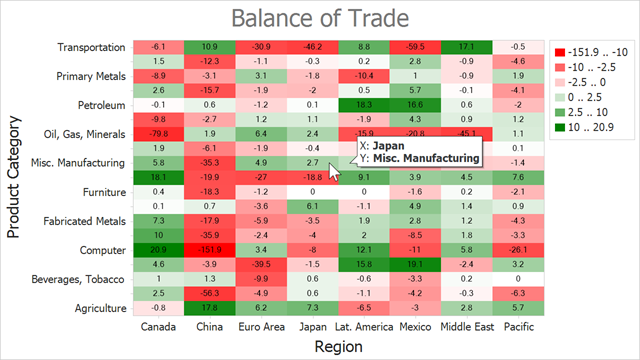HeatmapControl.ToolTipEnabled Property
Specifies whether tooltips are displayed for heatmap cells.
Namespace: DevExpress.XtraCharts.Heatmap
Assembly: DevExpress.XtraCharts.v25.1.UI.dll
NuGet Package: DevExpress.Win.Charts
Declaration
Property Value
| Type | Description |
|---|---|
| Boolean | true if tooltips are enabled; otherwise, false. |
Remarks
Use the HeatmapControl.ToolTipController property to access tooltip settings.
Specify the HeatmapControl.ToolTipTextPattern property to format tooltip text. For advanced tooltip text customization, handle the HeatmapControl.CustomizeHeatmapToolTip event.
Example
The following example shows how to create a heatmap and bind it to a data source. In this example, the heatmap obtains data from an XML file.

- Add the HeatmapControl to the Form.
- Create a HeatmapDataSourceAdapter object and assign it to the HeatmapControl.DataAdapter property.
- Define the adapter’s DataSource property.
- Use the ColorDataMember property to define a data member that is used to determine cell colors.
Specify the following adapter properties to define data members that store heatmap arguments:
Create a HeatmapRangeColorProvider object and assign it to the heatmap’s ColorProvider property. The HeatmapRangeColorProvider paints cells based on a value range to which the cell value belongs.
- Add a HeatmapTitle to the heatmap’s Titles collection. Specify the title’s Text property.
- Use the heatmap’s Label property to configure cell label options. This example shows how to configure label text format.
- Set the
HeatmapControl.ToolTipEnabledproperty to true to enable tooltips. Specify the HeatmapControl.ToolTipTextPattern property to define tooltip text display format.
using DevExpress.XtraCharts;
using DevExpress.XtraCharts.Heatmap;
using System.Data;
using System.Drawing;
using DevExpress.Drawing;
using System.IO;
using System.Windows.Forms;
namespace BindHeatmapToDataSource {
public partial class Form1 : Form {
public Form1() {
InitializeComponent();
DataTable data = CreateDataSet("BalanceOfTrade.xml");
heatmap.DataAdapter = new HeatmapDataSourceAdapter() {
XArgumentDataMember = "Country",
YArgumentDataMember = "Product",
ColorDataMember = "Value",
DataSource = data
};
Palette palette = new Palette("Custom") { Color.Red, Color.White, Color.Green };
HeatmapRangeColorProvider colorProvider = new HeatmapRangeColorProvider() {
Palette = palette,
ApproximateColors = true,
LegendItemPattern = "{V1} .. {V2}"
};
heatmap.ColorProvider = colorProvider;
colorProvider.RangeStops.Add(new HeatmapRangeStop(0, HeatmapRangeStopType.Percentage));
colorProvider.RangeStops.Add(new HeatmapRangeStop(-10));
colorProvider.RangeStops.Add(new HeatmapRangeStop(-2.5));
colorProvider.RangeStops.Add(new HeatmapRangeStop(0));
colorProvider.RangeStops.Add(new HeatmapRangeStop(2.5));
colorProvider.RangeStops.Add(new HeatmapRangeStop(10));
colorProvider.RangeStops.Add(new HeatmapRangeStop(1, HeatmapRangeStopType.Percentage));
heatmap.Titles.Add(new HeatmapTitle { Text = "Balance of Trade" });
heatmap.Legend.Visibility = DevExpress.Utils.DefaultBoolean.True;
heatmap.Label.Visible = true;
heatmap.Label.DXFont = new DXFont("SegoeUI", 6);
heatmap.Label.Pattern = "{V}";
heatmap.Label.Color = Color.Black;
heatmap.ToolTipEnabled = true;
heatmap.ToolTipController = new DevExpress.Utils.ToolTipController {
AllowHtmlText = true,
ToolTipLocation = DevExpress.Utils.ToolTipLocation.RightTop,
ShowBeak = true
};
heatmap.ToolTipTextPattern = "X: <b>{X}</b>\nY: <b>{Y}</b>";
heatmap.EnableAxisXScrolling = true;
heatmap.EnableAxisYScrolling = true;
heatmap.EnableAxisXZooming = true;
heatmap.EnableAxisYZooming = true;
heatmap.AxisX.Title.Text = "Region";
heatmap.AxisX.Title.Visibility = DevExpress.Utils.DefaultBoolean.True;
heatmap.AxisX.Label.Staggered = false;
heatmap.AxisX.Label.ResolveOverlappingOptions.AllowStagger = false;
heatmap.AxisX.Label.ResolveOverlappingOptions.AllowRotate = false;
heatmap.AxisX.Label.ResolveOverlappingOptions.AllowHide = false;
heatmap.AxisY.Title.Text = "Product Category";
heatmap.AxisY.Title.Visibility = DevExpress.Utils.DefaultBoolean.True;
}
public static DataTable CreateDataSet(string xmlFileName) {
string filePath = GetRelativePath(xmlFileName);
if (!string.IsNullOrWhiteSpace(filePath)) {
DataSet dataSet = new DataSet();
dataSet.ReadXml(filePath);
if (dataSet.Tables.Count > 0)
return dataSet.Tables[0];
}
return null;
}
public static string GetRelativePath(string name) {
name = "Data\\" + name;
DirectoryInfo dir = new DirectoryInfo(Application.StartupPath);
for (int i = 0; i <= 10; i++) {
string filePath = Path.Combine(dir.FullName, name);
if (File.Exists(filePath))
return filePath;
dir = Directory.GetParent(dir.FullName);
}
return string.Empty;
}
}
}
The XML file structure looks as follows:
<?xml version="1.0" standalone="yes"?>
<BalanceOfTrade xmlns:xsi="http://www.w3.org/2001/XMLSchema-instance" xmlns:xsd="http://www.w3.org/2001/XMLSchema">
<xs:schema xmlns:xs="http://www.w3.org/2001/XMLSchema">
<xs:element name="Item">
<xs:complexType>
<xs:sequence>
<xs:element name="Country" type="xs:string"/>
<xs:element name="Product" type="xs:string"/>
<xs:element name="Value" type="xs:double"/>
</xs:sequence>
</xs:complexType>
</xs:element>
</xs:schema>
<Item>
<Country>China</Country>
<Product>Computer</Product>
<Value>-151.9</Value>
</Item>
<Item>
<Country>China</Country>
<Product>Oil, Gas, Minerals</Product>
<Value>1.9</Value>
</Item>
<Item>
<Country>China</Country>
<Product>Transportation</Product>
<Value>10.9</Value>
</Item>
<Item>
<Country>China</Country>
<Product>Apparel</Product>
<Value>-56.3</Value>
</Item>
<!--...-->
</BalanceOfTrade>
Related GitHub Examples
The following code snippets (auto-collected from DevExpress Examples) contain references to the ToolTipEnabled property.
Note
The algorithm used to collect these code examples remains a work in progress. Accordingly, the links and snippets below may produce inaccurate results. If you encounter an issue with code examples below, please use the feedback form on this page to report the issue.